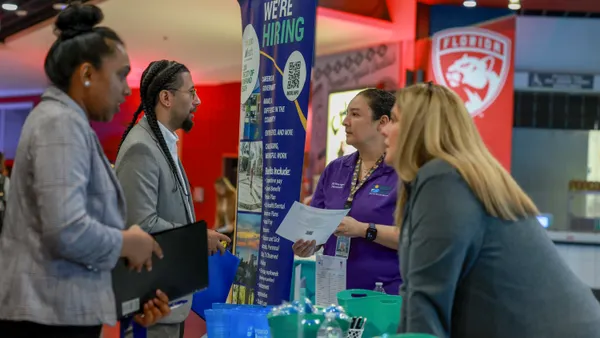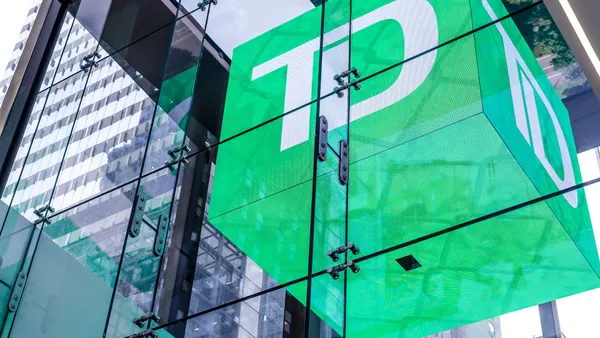The modern candidate experience leans virtual. It’s a process that, in the words of HireLogic Chief Marketing Officer Rich Mendis, is high volume and low touch. In some instances, the process has undergone heavy automation as companies introduced on-demand interviews, skills assessments and job simulations.
Fast, automated hiring may eliminate certain steps from the traditional recruiting process. But that’s not necessarily a good thing, Mendis told HR Dive in an interview. Take, for instance, the reference call. “It’s pretty important, especially these days,” Mendis said. “It’s a good practice to do your due diligence.”
By conducting reference calls, recruiters and hiring managers have the opportunity to confirm that what a candidate said is true. They can verify where someone worked, the duties they performed and the skills they developed. Recruiters can move beyond verification, of course. In speaking with a candidate’s former boss, mentor or colleague, they can gain insight into how the applicant worked and the strengths and weaknesses they may bring to the position in question.
This information is important — it ensures recruiters and hiring managers make informed decisions. In fact, senior managers remove 1 in 3 candidates from the running after checking their references, according to a 2019 Accountemps survey.
Plan ahead
To get the most useful information out of a reference call, Mendis recommended recruiters do some basic planning and prep work. When setting up a phone call, recruiters should be clear about what they want to discuss. This is the time to ensure confidentiality. “People won’t speak freely if they think the information they’re telling you might get back to the candidate,” Mendis said.
Once a call is scheduled, recruiters must get prepared to take notes. “You’re doing this to confirm you did your due diligence,” Mendis said. “You want to have a record of it in case something doesn’t work out with the employee in the future.”
Once these few steps are taken care of, recruiters are ready for the call. Recruiters and hiring managers need not plan unique questions for each reference they speak with — in fact, reference calls should follow a general script, Mendis said. That way, recruiters can compare candidates more consistently.
The exact questions recruiters include in these scripts will vary. But the conversations should cover three areas: verification, insight and opinion.
Verify the details
Reference calls exist so employers can confirm what candidates tell them. Start with the basics: Verify the applicant’s previous title and employment dates. Ask a reference to speak about the responsibilities the candidate had when they worked together, Mendis said. Ask if the applicant was dependable, timely, collaborative.
“You shouldn’t be trying to do too much discovery about the candidate,” Mendis said. “You should be trying to verify that what the candidate told you was in fact correct.”
To this end, interviewers should avoid the personal. Just as when interviewing candidates, recruiters should avoid asking about any topics covered by EEO laws: age, gender, race, religion, sexuality, ability, etc.
“Individuals involved in the hiring process should avoid asking questions regarding a candidate’s protected characteristics,” according to Morrison Foerster Partner Michael Schulman. “Many of these are fairly well known, including race, age, religious beliefs, sexual orientation and disability status.”
But there are other protected characteristics set up at the state level employers need to consider. For instance, familial status — including whether an individual is married or has children — is protected in many states, as well as hairstyle and military status, Schulman told HR Dive. “Hiring managers and recruiters should stay informed of protected characteristics in the jurisdictions in which they and their candidates are located.”
Uncover the insight
While reference calls are first and foremost opportunities to verify, recruiters and hiring managers can use the calls to learn a little more about the candidate. For instance, Mendis said, references can offer some insight into how an applicant interacted with their colleagues or how they communicated.
“That’s kind of the stuff you’re trying to figure out,” Mendis said. “You’re making sure they were actually a good employee with respect to the type of role you’re hiring them for.”
Mendis offered several examples of questions that can help recruiters uncover this kind of insight:
- How did the candidate support co-workers?
- Why did they leave their position?
- What are their strong points?
- What are their weak points?
- How did they get along with other people?
- Do they have good communication and listening skills?
- Were there any behaviors that affected their job performance?
Ask for opinions
As the conversation comes to an end, recruiters can venture into the land of personal opinion, perhaps by asking the reference whether they would hire the applicant for their own team again.
“Generally speaking, if it’s a no, you want to know why,” Mendis said. “That ‘why’ may or may not be relevant to this candidate.”
References may pass on hypothetically re-hiring candidates because they prefer workers with more experience. Or perhaps a former position was eliminated altogether.
It’s fine to ask for a reference’s opinion, Mendis said. “But you have to be objective about whether that impacts your decision or not.”













